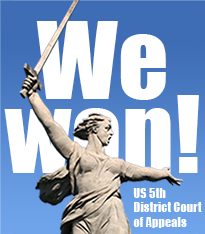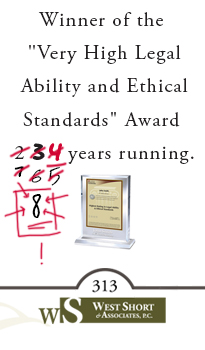5th Circuit Reverses Vacatur in Perpetual-License Case
By John Council | April 22, 2013
In another example of how difficult it is to overturn an arbitration award in federal court, the 5th U.S. Circuit Court of Appeals has reversed and remanded a vacatur. The decision in Timegate Studios Inc. v. Southpeak Interactive LLC, et al., comes after an arbitrator had awarded a defendant a “perpetual license” to a disputed video game –– a result not contemplated in the parties’ arbitration contract.
West Short, of Georgetown’s West Short & Associates who represents the defendants, says the decision is a big win not only for his clients but also for the arbitration process as well.
“I see this as a tremendous victory for arbitration as a means of resolving disputes. For my clients, obviously, it’s a tremendous personal victory. They are very pleased that the award they spent so much time and energy on is going to be confirmed based on the 5th Circuit’s ruling,” says Short, who notes his client spent almost a million dollars trying the case before an arbitrator.
“It’s a situation of getting what you’ve asked for. When you sign a contract that grants broad power to an arbitrator, then you shouldn’t be surprised when he uses that power,” Short says.
Lynne Liberato, a partner in Haynes and Boone in Houston who represents Timegate, says her client has not yet decided whether to appeal the decision. She believes the ruling is not healthy for the arbitration process.
“It’s bad for arbitration because at a certain point, if there are no external controls over arbitration, clients are going to run away” from it, Liberato says.
The background in the case is as follows, according to the 5th Circuit’s April 9 decision.
The defendants include Southpeak Interactive and Gamecock Media Groups (collectively referred to in the opinion as Gamecock) who collectively operated as a video game publisher. The parties entered into a contract in which Timegate Studios would create a video game called “Section 8″ while Gamecock was to be the publisher of the game. When their business relationship deteriorated, the parties proceeded to arbitration with their contract dispute.
Specifically, the publishing agreement granted Gamecock a “non-exclusive right and license” to use the game’s trademarks solely in connection with the packing, sale, marketing, advertising and distribution of Section 8. However the agreement makes clear that Timegate would remain the “exclusive owner” of the game’s intellectual property.
The arbitrator awarded Gamecock $7.3 million and a perpetual license of the game’s intellectual property. The arbitrator found that “Timegate had actively engaged in a litany of fraudulent misrepresentations and contractual breaches” and that Timegate had “induced Gamecock to enter into the Publishing Agreement by fraud.”
The arbitrator also amended the publishing agreement as a matter of law to also award Gamecock a perpetual license of the game’s intellectual property.
The district court later vacated the award, ruling that even though a finding of fraud permits an arbitrator to fashion an award that conflicts with contractual provisions, any such award must still be “rationally inferable from the parties’ central purpose in drafting the agreement.” The district court concluded that the arbitrator’s creation of the perpetual license was not a remedy rationally rooted in the contract. Timegate appealed the decision to the 5th Circuit. [See ”Arbitration Shoot ‘Em Up: Vacatur of $7.3MiIlion Award Will Lead to 5th Circuit Showdown” Texas Lawyer, April 2, 2012, page 1.]
PERPETUAL AS PERMISSIBLE
The 5th Circuit found that awarding Gamecock a perpetual license to the game was permissible for several reasons, among them that a finding of fraud can provide an arbitrator with a basis for voiding provisions of a contract. It also found that the 35-page contract contained hundreds of individual provisions governing every aspect of the parties’ relationship, and any award that attempted to compensate one party for the other’s breaches will inevitably realign some of the original contract’s provisions.
“If the ‘essence’ of such a complex contract rested on every provision in the contract, an arbitrator could not possibly fashion a remedy,” Judge W. Eugene Davis wrote in an opinion joined by Chief Judge Carl Stewart and Judge Edith Brown Clement.
‘We conclude that the Section 8 perpetual license is rationally rooted in the Agreement’s essence. Timegate committed an extraordinary breach of the Agreement, and an equally extraordinary realignment of the parties’ original rights is necessary topreserve the essence of the Agreement,” Davis wrote. “Because the Agreement bestowed broad remedial powers upon the arbitrator and because it was fraudulently induced and irreversibly violated by Timegate, the perpetual license is a rational and permissible attempt to compensate Gamecock and maintain the Agreement’s essence.”
Liberato says that her client denies that they committed fraud.
“I would have loved to have talked to the court about why the fraud findings were wrong and the evidence didn’t support a fraud finding, but clearly that’s not the law,” Liberato says, noting that the 5th Circuit was bound by the arbitrator’s factual determinations.
‘We couldn’t challenge the fraud finding the way we could in an appeal. So, if an arbitrator finds fraud, you’re stuck with that finding,” Liberato says. “And then if the decision from the arbitration flows from that, then you’re in big trouble.”
ln recent years, the 5th Circuit has been reluctant to affirm vacatur of arbitration awards. ln 2007’s Positive Software Solutions Inc. v. New Century Mortgage Corp, et al., an en bane 5th Circuit reversed a three-judge panel decision that had affirmed a U.S. district court’s vacatur of an arbitration award, after the en bane court found that the “mere appearance” of an arbitrator’s bias was not sufficient reason for vacatur. And in 2009, the 5th Circuit ruled in Citigroup Global Markets Inc. v. Bacon that arbitrators’ manifest disregard of the law was not a ground for vacatur.





